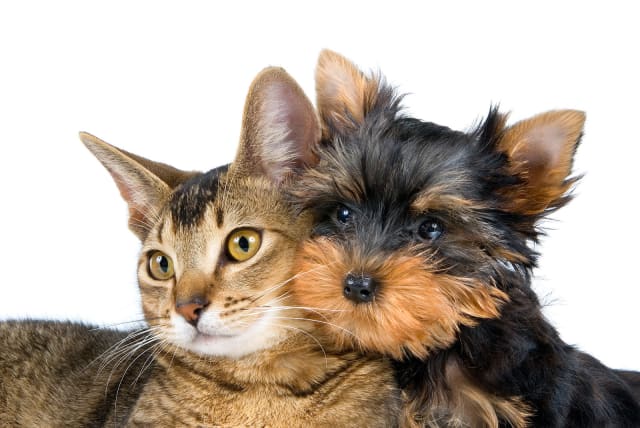Danish scientists paws for thought – bow-Wow or me-Ow?

Pet owners were found to be more attached to dogs than cats, but it varied significantly among countries.
Cats are solitary animals and usually manage on their own, but pet dogs are very social and pack-oriented and need to be close to their owners. Does that mean that canines get more care than felines?
Some studies have suggested pet owners are less emotionally attached to and less willing to finance care for cats than dogs, possibly because of cats’ behavior. Felines may be regarded as caring less about people and needing less care in return. However, these studies are often conducted on non-representative samples and don’t consider possible cultural differences in attitudes to pets.
Now, a team of Danish scientists led by Dr. Peter Sandøe of the food and resource economics department at the University of Copenhagen wanted to investigate the matter more seriously. He and his team published their findings in the journal Frontiers in Veterinary Science under the title “Do people really care less about their cats than about their dogs? A comparative study in three European countries.”
Multi-country survey
The scientists used a survey company to recruit representative samples of adult pet owners from the UK, Denmark and Austria, which as European countries are similar in many ways, but they all urbanized at different points in history – the UK first, Denmark last and Austria in between. The scientists suggested that a more distant history with rural animals among the general population is a cultural factor that might affect societal attitudes towards pets today.
The scientists’ final sample of pet owners consisted of 2,117 people who owned either a dogs or cat: 844 dog owners, 872 cat owners, and 401 owners who had both. They were asked questions listed in the Lexington Attachment to Pets Scale, which is meant to understand owners’ emotional attachment, as well as questions about how much they invest in veterinary care and their expectations for available care.
Differences in the willingness to pay for and/or provide a certain level of health care for the animal is a commonly used measure to compare the degree to which people care about dogs and cats. One study measured willingness to seek out veterinary care for dogs and cats, finding that cats are seen by veterinarians significantly less often than dogs, even in households that contain both species. They found that people seemed to care more about their dogs than their cats in all countries across all measures, with higher attachment scores for their dogs.
A different study found that dog owners were more likely to vaccinate their pet and to give pills twice a day for a month than cat owners, and that dog owners were more likely than cat owners to spend 10 minutes three times a day for six weeks to train their pet. But the new study showed striking differences in attitudes among the countries. Although the preference for dogs was only slight in the UK, in Austria the preference was more marked, and in Denmark, it was very marked.
“It doesn’t seem to be a universal phenomenon that people care much less about their cats than their dogs,” said Sandøe. “We suggest instead that the difference is likely to depend on cultural factors, including whether the animals spend a lot of time with their own. There seems to be no natural limit to how much people will end up caring about their dogs compared to their cats,” he continued. “The British are often portrayed as a nation of cat lovers, which is certainly confirmed by our study. The Danes have a long way to go but they may eventually get there.”
This may be due to a more recent more agricultural past, where most animals are kept at a greater distance, and dogs work much more closely with humans than cats, he said, but other factors could be involved. For instance, people may take more care to insure their dogs because dog treatment is more expensive or report greater attachment to dogs because the dogs help them in everyday life, especially by exercising while walking them every day.
Jerusalem Post Store
`; document.getElementById("linkPremium").innerHTML = cont; var divWithLink = document.getElementById("premium-link"); if (divWithLink !== null && divWithLink !== 'undefined') { divWithLink.style.border = "solid 1px #cb0f3e"; divWithLink.style.textAlign = "center"; divWithLink.style.marginBottom = "15px"; divWithLink.style.marginTop = "15px"; divWithLink.style.width = "100%"; divWithLink.style.backgroundColor = "#122952"; divWithLink.style.color = "#ffffff"; divWithLink.style.lineHeight = "1.5"; } } (function (v, i) { });
